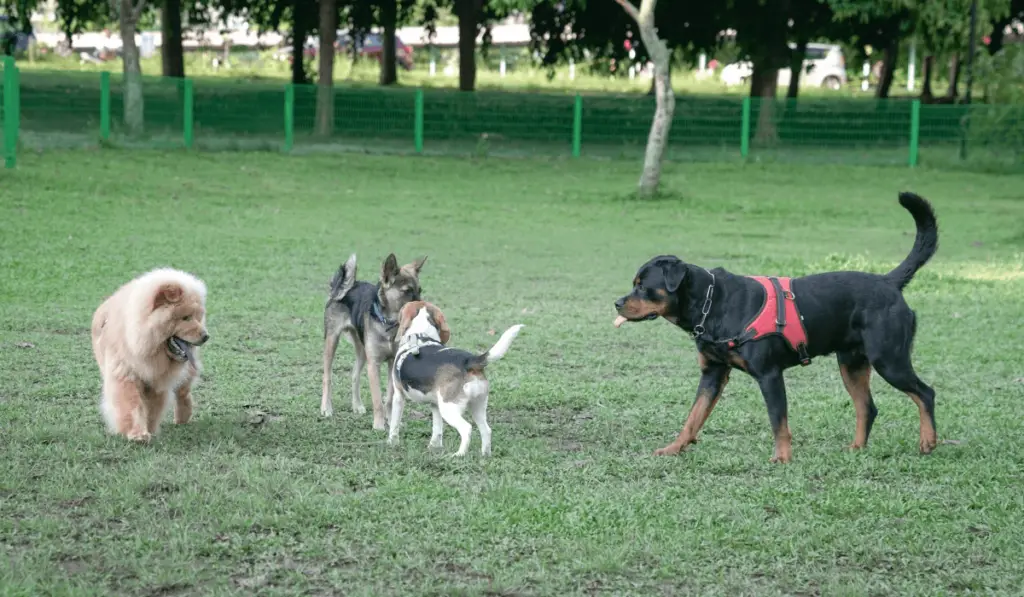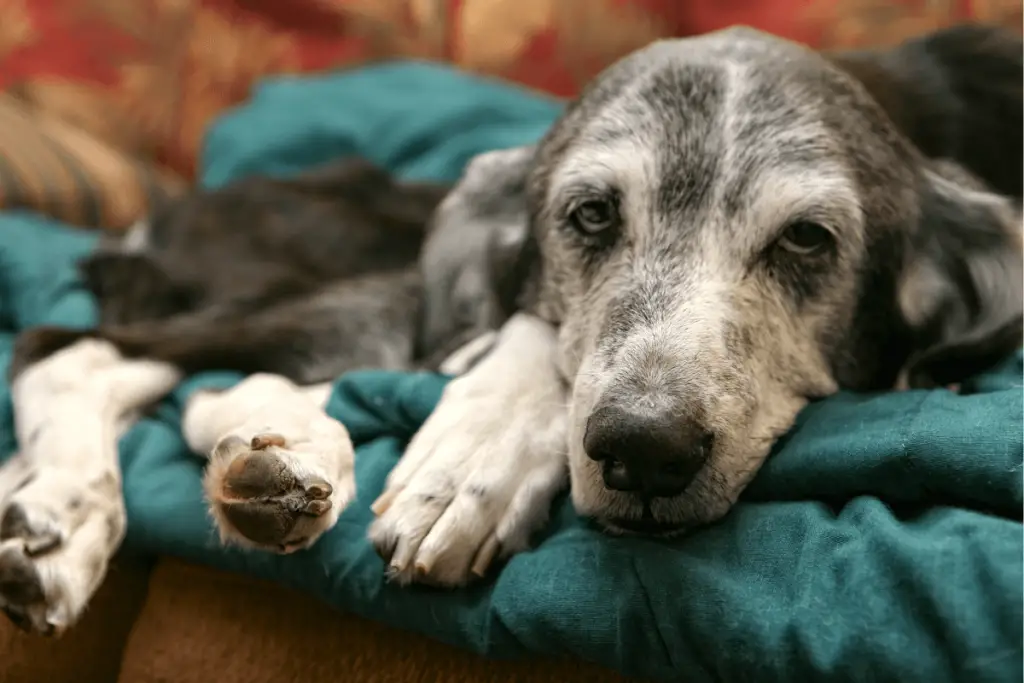Over The Counter Giardia Treatment For Dogs – What To Feed?

Dealing with a dog suffering from Giardia can be frustrating. You want to see your furry friend happy and healthy again.
The right diet is a key part of their recovery – but what to feed a dog with giardia?
Focus on a bland diet to ease your dog’s digestive distress. This means easily digestible foods like boiled chicken, white rice, and plain yogurt.
Your veterinarian might also recommend supplements like probiotics to restore healthy gut bacteria.
Dietary changes are just one part of conquering Giardia.
Below, we will look over the counter giardia treatment for dogs – causes of this infection, treatment options, and specific food recommendations to support your dog’s healing.
Key Takeaways
- Giardia is a common, and treatable, but potentially contagious parasite.
- Diarrhea is the main symptom of giardia. Symptoms are key, but testing is essential.
- Treatment involves medication and diet. Antiparasitic medications are necessary to eradicate giardia.
- A bland diet of easily digestible foods like cooked chicken, white rice, and pumpkin soothe your dog’s digestive system during recovery.
What is Giardia in Dogs?
Giardia is a microscopic intestinal parasite that infects not only dogs but also other mammals, and even humans.
This widespread parasite is responsible for giardiasis, a parasitic infection that causes diarrhea and other digestive issues in dogs.
It is one of the most common intestinal infections affecting 15% of dogs worldwide.
The primary culprit is Giardia intestinalis (also known as Giardia duodenalis or Giardia lamblia).
Dogs become infected after ingesting Giardia cysts, which are passed in the stools of contaminated animals.
Note: Giardia is zoonotic, meaning it can be transmitted between dogs and humans. It’s essential to practice proper hygiene and sanitation measures to prevent cross-contamination, especially for pet owners.
Hold tight, let’s explore how giardia might affect your pup.
How Does a Dog Get Infected with Giardia?

Dogs become infected with Giardia primarily through the ingestion of microscopic cysts passed in the feces of other infected dogs or animals.
These cysts are hardy and can survive in the environment for weeks or even months. The most common ways dogs contract giardiasis include:
- If a dog drinks water from a source containing Giardia cysts (such as puddles, ponds, lakes, or streams), they have a high risk of infection.
- Dogs can easily pick up cysts by stepping in infected feces and subsequently licking their paws or fur. Direct contact with the feces of dogs infected with giardia or cats can also lead to transmission.
- Environments like dog kennels, shelters, and daycare centers may harbor cysts on surfaces, toys, or in the soil. Dogs can pick these up while playing, exploring, or grooming themselves.
- If a dog has cysts on their fur, especially around their hindquarters, they can easily reinfect themselves through normal grooming behaviors.
According to the Western College of Veterinary Medicine, Once giardia is ingested, the cysts transform into an active form called trophozoites in the dog’s intestines.
The trophozoites attach to the intestinal wall and, if present in large enough numbers, can lead to giardiasis, causing intestinal issues.
It takes between 5 to 12 days for an infected dog to start shedding cysts in their feces, and those cysts are immediately infectious.
Important Note: Even healthy adult dogs may shed Giardia cysts without displaying symptoms.
However, puppies and small dogs under six months old are especially vulnerable, and debilitated dogs face higher risks of severe illness.
Can Humans Get Giardia From Dogs?
According to the CDC, while Giardia is classified as a zoonotic disease (meaning it can jump between species), the risk of humans contracting Giardia directly from their dog is considered low.
This is because dogs and humans are typically infected by different strains of the Giardia parasite.
However, it’s important to understand that certain Giardia strains can infect both humans and animals like beavers, monkeys, and some pets. Therefore, taking precautions is important, especially if you have a dog diagnosed with giardiasis.
To minimize your risk, here’s what you can do:
- Prioritize handwashing: Thoroughly wash your hands with soap for a minimum of twenty seconds, right after handling dog feces, their toys, or any of their belongings.
- Regularly clean their things: Wash and disinfect your dog’s bedding, food, toys, and water bowls frequently.
- Maintain a clean environment: Clean and disinfect household surfaces, paying extra attention to areas your dog frequents.
- Handle soil with care: If gardening, wear gloves to reduce the chance of contact with potentially contaminated soil.
- Disease control: Prevent your dog from drinking from potentially contaminated water in the dog park and from coming in contact with the feces of a dog infected with giardia.
- Keep it dry: Giardia prefers damp environments, so ensure your home stays well-ventilated.
Symptoms of Giardia

Giardia infection in dogs can lead to a range of uncomfortable and sometimes concerning symptoms. It’s important for dog owners to be aware of the following potential symptoms:
- Diarrhea: This is the most common and visible symptom of giardia. The diarrhea can vary in consistency, being soft, watery, fatty, or containing mucus. Often, it has a foul odor and a greenish tint.
- Weight loss: Despite a normal appetite, a dog with giardia may lose weight due to the parasite interfering with nutrient absorption in the intestines. Seek advice from experts in veterinary medicine if you suspect weight loss is a result of a parasitic infection
- Dehydration: Frequent diarrhea can lead to dehydration. Monitor your dog’s water intake and look for signs like dry gums and lethargy. If you suspect dehydration, seek veterinary advice as this can become serious.
- Vomiting: While not as frequent as diarrhea, some dogs may vomit due to giardia infection.
- Gas: Excessive gas, especially when accompanied by other symptoms, may indicate a giardia infection in your dog’s system.
- Stomach discomfort: Your dog might exhibit signs of abdominal pain or cramping, seeming unusually uncomfortable.
- Poor coat condition: A giardia infection can affect your dog’s overall health, sometimes leading to a dull or less healthy-looking coat.
It’s important to remember that some dogs with giardia remain asymptomatic, meaning they show no signs of illness but can still spread the parasite.
If you suspect your dog may have giardia, even without overt symptoms, it’s best to consult your veterinarian.
And now, you’re thinking… how do I know for sure if my dog has giardia? Let’s find out!
Diagnosis
Accurately diagnosing giardiasis in dogs can be challenging, as traditional methods often have limitations.
While a routine fecal flotation test is a starting point, it may not always reliably detect the Giardia cysts due to inconsistent shedding in the stool.
This is why a special zinc sulfate flotation solution can increase the chances of detection. In some cases, the tiny parasites may be visible with a direct smear of feces, but this is also not foolproof.
If your veterinarian suspects giardiasis, the most reliable diagnostic approach involves testing the stool for Giardia-specific antigens (proteins).
Here’s where your vet will likely take a fecal sample to check for giardia parasites.
Several options offer varying levels of accuracy:
- Enzyme-linked immunosorbent assay (ELISA): A common in-clinic test, ELISA detects Giardia antigens with reasonable accuracy but can occasionally produce false positives or negatives.
- Immunofluorescent assay (IFA): A more sensitive test generally performed at a reference laboratory.
- Polymerase chain reaction (PCR): Considered the gold standard for Giardia detection, PCR is highly sensitive and specific.
In situations where clinical signs and history strongly suggest giardiasis, your veterinarian might initiate treatment even without a definitive test result (known as a presumptive diagnosis).
Let’s move on to exploring how to get your pup back on its paws.
Treatment of Giardia
Treatment typically involves prescription medication to eliminate giardia, coupled with careful dietary management to support their recovery.
According to VCAHospitals, the most commonly prescribed options in dog treatment include:
- Metronidazole (Flagyl®): This antibiotic is frequently the first-line treatment for giardiasis. It’s usually administered for 5-7 days, with some cases requiring extended or repeated courses. While effective, metronidazole may cause side effects such as nausea, vomiting, and loss of appetite.
- Fenbendazole (Panacur®): This dewormer shows effectiveness against Giardia and is typically given for 3-5 consecutive days.
According to a study from Pubmed, tinidazole (Tindamax®) works effectively against Giardia, often requiring only a single dose. It may be preferable for dogs who experience side effects with metronidazole.
Also in a research by PUBMED, a single dose of Nitazoxanide (Alinia®) drug 50mg/kg has proved effective for Giardia and is considered in cases where other conventional medications have failed.
If your dog experiences severe diarrhea or dehydration, additional supportive care like rehydration fluids and a low-residue, easily digestible dog’s diet will be necessary.
Throughout treatment, immediately remove and dispose of your dog’s feces to prevent reinfection.
To remove any cysts from their coat, bathe them regularly with dog shampoo. It’s highly recommended to use a steam cleaner on carpets, upholstery, and other surfaces your dog frequents.
We recommend retesting your dog two to four weeks after completing treatment to ensure the infection is eradicated.
It’s important to remember that your veterinarian will determine the most suitable medication and dosage for your dog’s specific needs. Never self-medicate your pet.
Speaking of special needs… Let’s explore the best ways to support your dog with nutrition during their recovery
What To Feed A Dog With Giardia
The cornerstone of feeding a dog with giardia is a bland, easy-to-digest diet. This helps soothe the inflamed gut and reduce the severity of symptoms.
Your veterinarian is the best source for specific diet recommendations, but here’s a general guideline:
- Easily digestible protein: Opt for cooked, lean meats like skinless chicken, turkey, or ground beef. You can also try low-fat cottage cheese as an alternative. Avoid giving your dog any contaminated food while they are recovering.
- Plain white rice: Cooked white rice is a gentle carbohydrate source that provides energy and is easily absorbed.
- Pureed pumpkin: Not the pumpkin pie filling, but pure canned pumpkin. It’s rich in fiber, which can help regulate bowel movements.
- Probiotics: These “good” bacteria can help rebalance the gut flora, which may have been disrupted by the giardia infection. Ask your veterinarian for a dog-specific probiotic supplement.
- Wet food can be added to their diet to provide additional moisture and support hydration.
Offer smaller meals throughout the day instead of large portions to reduce strain on the digestive system.
Dehydration is a concern with diarrhea, so keep fresh, clean water available at all times.
If your dog has known food sensitivities, work with your vet to ensure their bland diet doesn’t trigger adverse reactions.
What to Avoid
- Fatty or rich foods can further irritate the digestive system and worsen giardia symptoms.
- Many dogs are lactose intolerant, and Dairy products (other than low-fat cottage cheese) can contribute to diarrhea.
- Avoid treats and table scraps, stick to the bland diet until your dog fully recovers.
- Raw diets carry a higher risk of bacterial contamination and aren’t recommended for dogs with compromised immune systems.
While these guidelines offer a starting point, it’s essential to consult with your veterinarian for a personalized nutrition plan for your dog.
They may also recommend specialized prescription dog food formulated for sensitive stomachs or intestinal health.
Remember: With a proper diet and medication, most dogs make a full recovery from giardia. Be patient, follow your veterinarian’s instructions, and your furry friend will be back to their healthy self in no time.
Conclusion
Giardia is a common, yet treatable, intestinal infection in dogs.
While medication is essential to eliminate the parasite, proper nutrition plays an important role in supporting your dog’s recovery and minimizing discomfort.
Focusing on a bland, easily digestible diet – with ingredients like cooked chicken, white rice, and pumpkin – will soothe their digestive system and promote healing.
Remember to work closely with your veterinarian to determine the best dietary approach and medication plan for your furry companion.
With prompt diagnosis, treatment, and a carefully tailored diet, most dogs make a full recovery from giardia.
Have you ever dealt with a giardia infection in your dog? What were some of the challenges you faced? Share your experiences in the comments below
FAQs
How long does Giardia in dogs last?
Untreated: Giardia infections can last for weeks or even months in untreated dogs.
Treated: With appropriate medication, Giardia typically clears up within a few weeks. However, it may take a couple of rounds of treatment to fully eliminate the parasite.
Follow-up tests are important to confirm full recovery.
Is there a vaccine for Giardia?
Yes, a vaccine is available. It helps reduce the severity of symptoms and shedding of the parasite if a dog gets infected.
According to recent research, it’s important to note that the vaccine doesn’t guarantee 100% protection against Giardia. Discuss with your veterinarian whether the vaccine is right for your dog.
Does yogurt help in dogs with Giardia?
Yogurt won’t treat Giardia. While plain yogurt containing probiotics might be beneficial for general gut health, it won’t cure a case of giardiasis.
Giardia requires specific medications prescribed by your veterinarian for treatment
